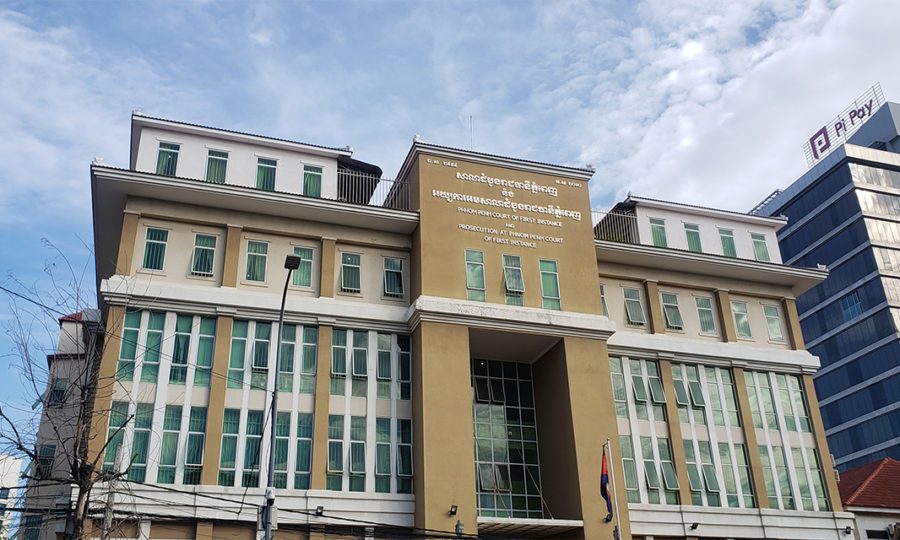A teenager whose father is an imprisoned former CNRP member was tried on Wednesday for incitement and insult, giving contradictory answers and having his mental health questioned — and dismissed — by court officials.
The 16-year-old is the son of Kak Komphear, who was convicted for participating in a CNRP 2018 election boycott call and is facing other charges related to the dissolved opposition party. The boy is charged with incitement and insulting public officials over messages in a Telegram group and Facebook posts from June this year.
The trial commenced on Wednesday, weeks after United Nations experts called for the release of the boy, who has autism spectrum disorder. The boy’s mental health was discussed during the trial, but the court refused to allow an expert to examine the teenager.
Defense lawyer Sam Sokong requested for an expert examination but presiding judge Uong Vuthea said he wouldn’t allow it and that a similar request during the investigation period had been turned down as well.
Sor Sota, another judge, asked the boy if he had got treatment for his condition but the teenager seemed confused with the question — a trend that continued through most of his testimony. He was quiet and seemed unconcerned at being put under court questioning.
Deputy prosecutor Kim Hongsan was more dismissive of the family’s assertion that the boy had autism. He said the boy could not have autism because he was knowledgeable and was educated till grade 9.
Additionally, the boy could use Facebook and had accepted an invitation and posted in a Telegram group, Hongsan said, arguing that it showed he did not have autism.
“So, it means that he has a full state of mind. There is no proof showing that he has a mental illness or autism,” Hongsan said.
During questioning, the boy admitted to the allegations against him but often his answers were contradictory, unclear and he had problems understanding the judge’s and prosecution’s questions.
Khun Sona, the third judge on the panel, had to ask the boy three or four questions to which he received ill-fitting responses. After getting the teenager to say that he was not instructed by anyone to make comments on social media, Sona wanted to know if it was for revenge.
“Why did you write all those insulting words, what is the reason?” Sona queried. “What revenge do you have?”
The teenager said, “I don’t have any revenge. I wrote it myself.”
“What is your intention? How did you come up with this writing?” Sona asked.
“I got angry and I hate the leaders,” said the boy, who answered the question after being repeatedly asked the same question.
Judge Sota then asked if the boy had created the Telegram group where he allegedly posted insulting audio messages, to which the boy first answered yes but then later said he had been added to the group by someone else.
Prum Chantha, the boy’s mother and active member of the “Friday Women of Cambodia” activists, said her son did not speak till he was 7 years old, and was withdrawn and kept to himself.
She added that she had taken him to doctors but never got a specialist to diagnose her son, saying the family moved around a lot and didn’t have the money to afford it.
Hongsan, the deputy prosecutor, again commented on the boy’s medical condition, arguing that the family did not socialize enough and lived by themselves, which could have caused the boy’s reticence.
Chantha continued that she did not know her son was in the Telegram group, and comments made by him there were in response to insults made against the boy’s father, Komphear.
“Someone yelled that his father was a traitor, so he scolded back. I want the court to find those involved to come face to face and don’t put the blame [on my son] alone. There is no smoke without fire,” she said.
In closing, Sokong said that his client’s mental health condition was a factor in the case and that the boy’s ability to use Telegram or Facebook could not be used to dismiss his mental health.
He also took umbrage with the police’s assertion that the boy was caught in a red-handed crime because the case file points to incriminating messages and posts from June 4, 20 and 23, but he was arrested only on June 24, after 8 p.m.
“I concluded that my client did not commit as he is charged because he has autism. So, I ask the presiding judge to decide to rid my client of the charges of incitement and insult, and release him.”
The judges are scheduled to deliver a verdict on October 13.
The boy was also arrested in 2020 for breaking into the old CNRP headquarters in Phnom Penh, which is in the court’s control in relation to a separate conviction against former party president Sam Rainsy. The teenager was released after being questioned by the police. He was also attacked in public in April, when two strangers on a motorbike hurled a brick at his head. His mother alleged the assault was political.












